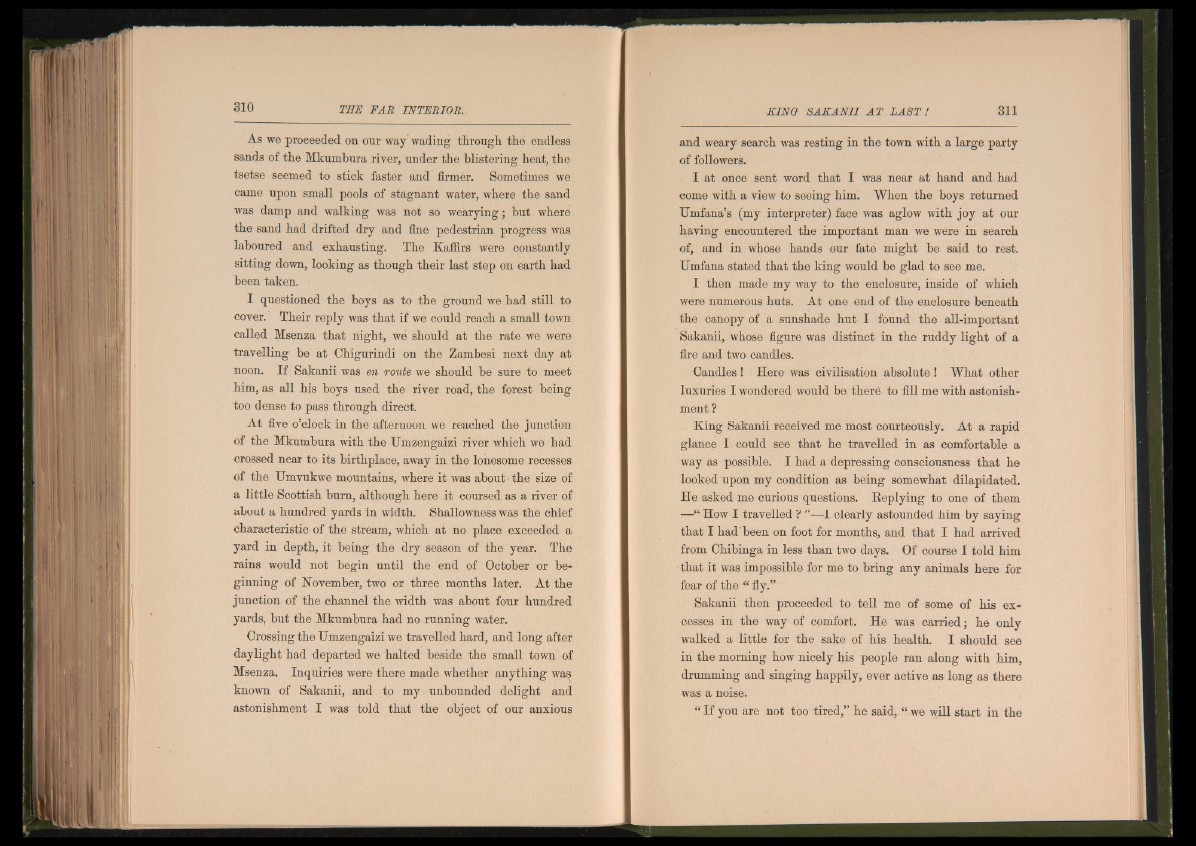
As we proceeded on our way wading through the endless
sands of the Mkumbura river, under the blistering heat, the
tsetse seemed to stick faster and firmer. Sometimes we
came upon small pools of stagnant water, where the sand
was damp and walking was not so wearying ; but where
the sand had drifted dry and fine pedestrian progress was
laboured and exhausting. The Kaffirs were constantly
sitting down, looking as though their last step on earth had
been taken.
I questioned the boys as to the ground we had still to
cover. Their reply was that if we could reach a small town
called Msenza that night, we should at the rate we were
travelling be at Ohigurindi on the Zambesi next day at
noon. If Sakanii was en route we should be sure to meet
him, as all his boys used the river road, the forest being
too dense to pass through direct.
At five o’clock in the afternoon we reached the junction
of the Mkumbura with the Umzengaizi river which we had
crossed near to its birthplace, away in the lonesome recesses
of the Umvukwe mountains, where it was about the size of
a little Scottish burn, although here it coursed as a river of
about a hundred yards in width. Shallowness was the chief
characteristic of the stream, which at no place exceeded a
yard in depth, it being the dry season of the year. The
rains would not begin until the end of October or beginning
of November, two or three months later. At the
junction of the channel the width was about four hundred
yards, but the Mkumbura had no running water.
Crossing the Umzengaizi we travelled hard, and long after
daylight had departed we halted beside the small town of
Msenza. Inquiries were there made whether anything was
known of Sakanii, and to my unbounded delight and
astonishment I was told that the object of our anxious
and weary search was resting in the town with a large party
of followers.
I at once sent word that I was near at hand and had
come with a view to seeing him. When the boys returned
Umfana’s (my interpreter) face was aglow with joy at our
having encountered the important man we were in search
of, and in whose hands our fate might be said to rest.
Umfana stated that the king would be glad to see me.
I then made my way to the enclosure, inside of which
were numerous huts. At one end of the enclosure beneath
the canopy of a sunshade hut I found the all-important
Sakanii, whose figure was distinct in the ruddy light of a
fire and two candles.
Candles ! Here was civilisation absolute ! What other
luxuries I wondered would be there to fill me with astonishment
?
King Sakanii received me most courteously. At a rapid
glance I could see that he travelled in as comfortable a
way as possible. I had a depressing consciousness that he
looked upon my condition as being somewhat dilapidated.
He asked me curious questions. Replying to one of them
—“ How I travelled ? ’^ 1 clearly astounded him by saying
that I had'been on foot for months, and that I had arrived
from Chibinga in less than two days. Of course I told him
that it was impossible for me to bring any a.nima,1s here for
fear of the “ fly.”
Sakanii then proceeded to tell me of some of his excesses
in the way of comfort. He was carried; he only
walked a little for the sake of his health. I should see
in the morning how nicely his people ran along with him,
drumming and singing happily, ever active as long as there
was a noise.
“ If you are not too tired,” he said, “ we will start in the